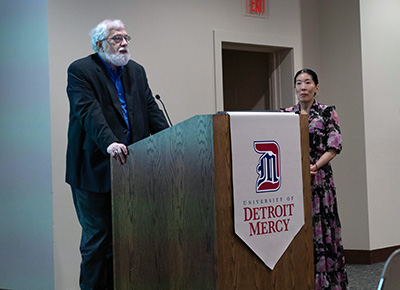Detroit Mercy's Black Abolitionist Archive: Unveiling Black Voices of Freedom
 The Black Abolitionist Archive lives in University of Detroit Mercy’s McNichols Campus Library as a testament to the enduring struggle against slavery and the pursuit of freedom. It is overseen by Professor Roy E. Finkenbine, whose expertise spans throughout his decades-long career.
The Black Abolitionist Archive lives in University of Detroit Mercy’s McNichols Campus Library as a testament to the enduring struggle against slavery and the pursuit of freedom. It is overseen by Professor Roy E. Finkenbine, whose expertise spans throughout his decades-long career.
Established during the United States’ bicentennial year of 1976 and brought to Detroit Mercy 20 years later, the Black Abolitionist Archive emerged from a federally funded initiative known as the Black Abolitionist Papers Project.
“They were looking for speeches, editorials, and letters in an effort to tell the story of Black involvement in the fight against slavery,” said Finkenbine.
With approximately 1,400 newfound documents, the project entered its second phase in 1981, welcoming Finkenbine, then a fresh-faced graduate student, to its ranks.
“The goal here was to make [the documents] accessible to scholars and students,” he said.
Negotiations to bring the project to Detroit Mercy began in 1996, according to Finkenbine. He and his wife took a road trip to bring the documents cross-country. The archive was then housed in various places in the Briggs Building, before finding a dedicated space in the Library in 2008.
“The story is aimed at the south, but it makes more sense for people in the north to be able to access it.”
For Finkenbine, the significance of the archive lies in the voices preserved within the official documents and historic dates. These narratives pushed people who had never interacted with slavery before to have a newfound empathy for the struggles endured by enslaved people.
"What I find the most fascinating are the documents from or by people who had been enslaved and are now part of the movement," he remarked. "They told some of the most horrific stories of being enslaved. The goal of the authors was to appeal to things white audiences could understand. A lot of them are parents, a lot of them have spouses. Discussing how your marriage has been affected by slavery and how your relationship with your children had been affected by slavery left audiences aghast."
Finkenbine’s recent push is to digitize the huge collection.
The Black Abolitionist Archive contains about 2,000 documents, many of them speeches and editorials. It can be found in the special collections section of the library main page.
Digitization of the Archive has changed the accessibility of historical documents worldwide.
Finkenbine says “We regularly get notice from scholars and graduate students that this has been helpful for their research or classes because we can digitize all the stuff you want to look at and send it to you.”
Finkenbine describes the global reach of the digital collection, stating “I met Ta-Nehisi Coates about 2013, when I provided him with some research and info for his groundbreaking essay The Case for Reparations that appeared in 2014 in the Atlantic. Over the last eight years, I have helped bring a number of leading voices to campus. These include National Book Award winners like Coates and Ibrahm X. Kendi as well as Caleb McDaniel, who won the Pulitzer Prize in History, and the MacArthur "Genius Grant" winner Tiya Miles. I have also reached a host of bestselling authors such as Crystal Fleming, Ilyon Woo, Tyehimba Jess, Gerald Walker, Margaret Burnham, Clint Smith and others.”
The archive serves as a powerful reminder of the atrocities of slavery and the resilience of those who dared to resist. By bringing these voices to light, Finkenbine hopes to inspire future generations to stand up against injustice and inequality.
"In the decade before the Civil War, out of a nation of about 30 million people, there were only about a million who were actively engaged in the fight against slavery who ultimately drove the nation to a civil war that got rid of slavery," he noted. "That statistic gives me hope that maybe we can spark things in the present that make a difference."
— By Marketing & Communications student intern Sam Gillmore
